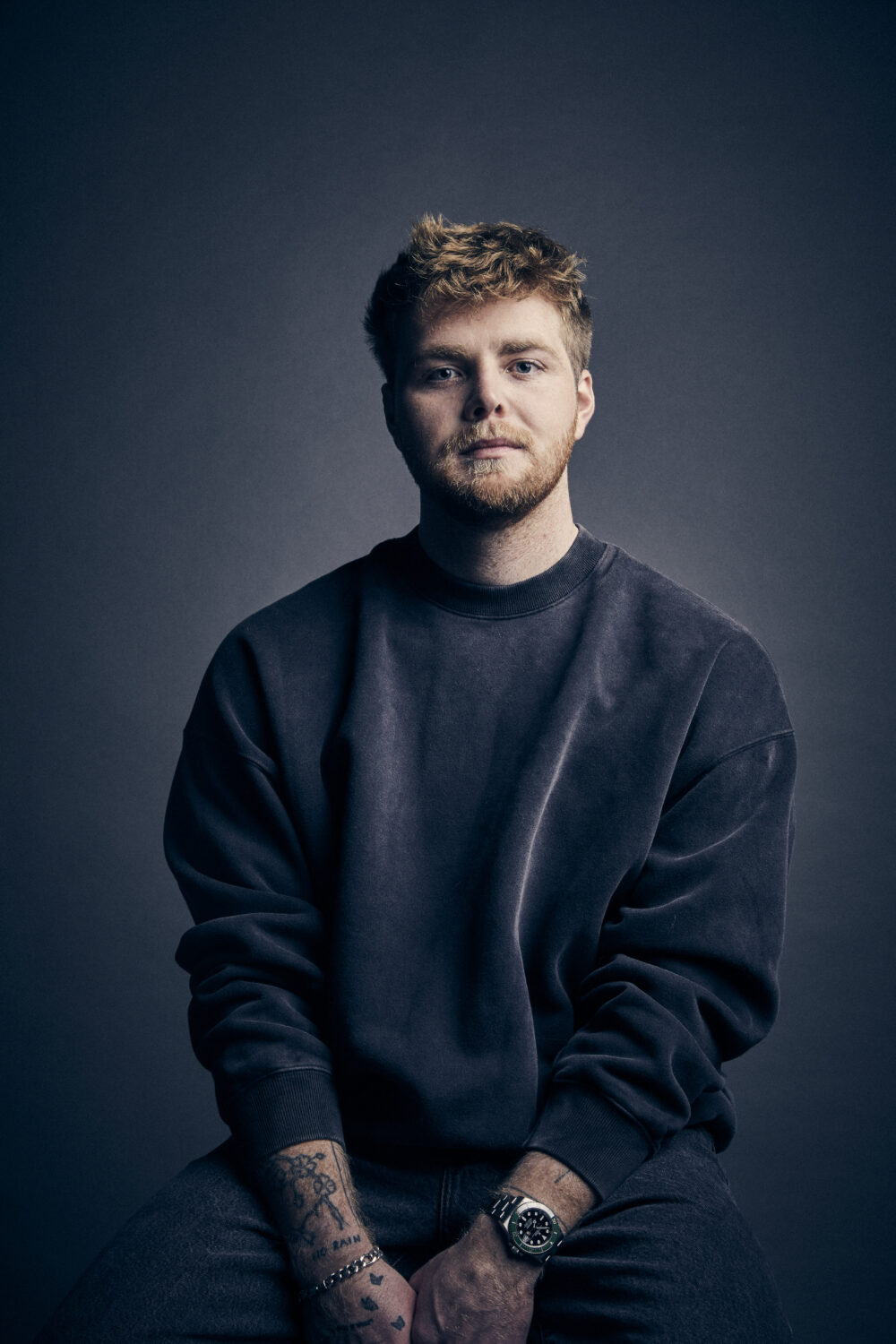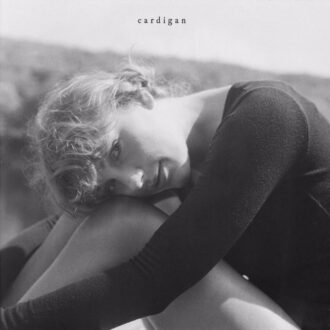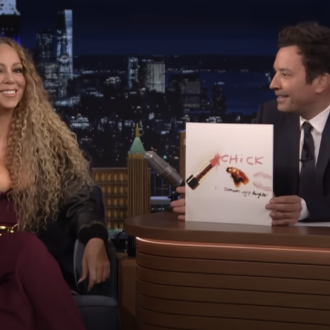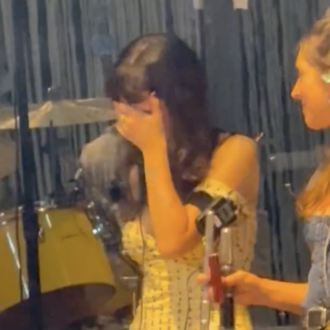Alex Warren’s Journey From Influencer To Pop Star Is Becoming The New Ordinary

The #3 single in America, slowly climbing out of the looming shadows of “Die With A Smile” and the still-charting “Pink Pony Club,” is a pop-rock song called “Ordinary.” The track sounds instantly familiar: a towering edifice of sound with multitracked, devotional-coded vocals in a perpetual rousing chorus, lyrics that equate the wife-guy lifestyle to breathless religious surrender, and a voice that projects more gravitas than the fratty-looking zoomer that’s intoning it. It pointedly aspires to couples dances and wedding tributes — there’s a separate “Wedding Version,” for the besotted among you.
But the artist, Alex Warren, maybe isn’t so familiar. Maybe you’ve heard him on the radio alongside his peers Benson Boone or Teddy Swims. Perhaps you caught his Jimmy Fallon showcase recently. Or perhaps you heard him jamming with Ed Sheeran and Shaboozey at a Coachella satellite event. You’ve certainly heard people like him. But who, exactly, is he? To answer that question, unfortunately, we have to talk about the Hype House.
The Hype House was a Los Angeles collective of TikTok influencers and their orbiters that was active throughout the first half of the 2020s. Warren was one of the original members — he’s the one who came up with the name. He shared the house with now-wife Kouvr Annon; founder and YouTuber Thomas Petrou; a pre-“Diet Pepsi” Addison Rae; TikTok megastar Charli D’Amelio and her sister Dixie; and dozens of other TikTok stars and aspirants, 42 in all. The Hype House wasn’t the first so-called “content house” — one list online counts several dozen, including the Vibe Crew, the Collab Crew, and the accurately named House Nobody Asked For — nor was it the most notorious. But it’s probably the house with the biggest claim on the musical charts.
The Hype House was a literal house — a 16,000-square foot mansion in Hollywood Hills with 10 bedrooms, a lavish backyard and pool, plentiful mirrors, souped-up sound, and other influencer-friendly amenities. It was a short-run, abysmally reviewed Netflix reality show, in which Warren was heavily featured. But it was also a job. The house and its inhabitants were the subject of a 2020 New York Times profile full of disconcerting quotes and bleak dispatches from the intersection of hustler grindset and viral fame. “You can’t come and stay with us for a week and not make any videos, it’s not going to work,” Petrie said. “This whole house is designed for productivity. If you want to party, there’s hundreds of houses that throw parties in LA every weekend. We don’t want to be that. It’s not in line with anyone in this house’s brand.”
It will not surprise you to hear that parties took place, nor that the house’s brand was quickly tarnished by inter-influencer drama. A full accounting of the fallout is out of scope of this music column — for the morbidly curious, a partial yet extensive timeline can be found here — not least because Warren managed to escape most of the dirt.
He also escaped the house, announcing his departure in 2022 via a thoroughly unconvincing video about his supposed lack of hard feelings. Equally unsurprisingly, his cordiality was enforced by a battalion of NDAs and other restrictive contracts — details of which subsequently leaked. Once the hype disappeared from the Hype House, people started to talk; Warren did so on an episode of podcast Viall Files titled “Reality Roundup, Sp*rm Donor Profiles, [and] VPR Drama.” (You are not expected to understand this.) He gave a slightly realer story, said he and Petrou were no longer on speaking terms, and then pivoted to what he really wanted to talk about: his music.
Reality TV stars, YouTubers, and other minor celebrities have always had vanity music projects. (Some of them are even good!) But even their most clout-chasing, gossip-baiting songs still tried to be actual songs. The songs produced and inspired by content houses, despite their self-stylings as incubators of future talent, are usually less songs than drama with a beat. The ur-text of this genre, and probably the only one you’ve heard of unless you frequent influencer snark subreddits, is “It’s Everyday Bro” by Jake Paul. Paul, a YouTuber who later became a Trump-promoting boxer, got his bros from predecessor content house Team 10 to join him in an ordeal of disses, posturing, and amateur rap, The track is simultaneously low-effort yet sweaty with effort; it wears its awfulness as a kind of braggadocio. Because these kinds of songs tend to come in clusters, “It’s Everyday Bro” spawned several response tracks, most notably “Its EveryNight Sis,” by Violet and rival YouTuber RiceGum. (It’s better, but still awful.) The Hype House’s original contribution to the genre was secondhand: “Still Softish” by house orbiter Josh Richards, a vehicle to accuse various (non-Warren) members of the collective of cheating. (Once again, it is awful.)
After signing a deal with Atlantic Records in 2022, Warren entered the fracas with a song called “Burning Down,” posted a preview of the track to TikTok with the caption “Wrote this about that content house…” This wasn’t Warren’s first song — he’d been posting music online on a semi-anonymous burner, and by the time he released the acoustic ballad “One More I Love You” in 2021, his music was already well polished. “Burning Down” has a cheery melody, jaunty piano line, and smug self-confidence, evocative of countless inescapable radio hits. They serve a purpose: “Used to tell me you’d pray for me — you were praying for my downfall,” Warren sings, weaponizing the song’s own smarm against his foes.
Of course, despite being explicitly and intentionally a content-house diss track, “Burning Down” is different from the aforementioned slop: It’s trying to be a song. It had staying power — enough that Warren included it on his 2024 album You’ll Be Alright, Kid (Chapter 1), then juiced its lifespan further with a Joe Jonas remix. By comparison, “It’s Everyday Bro” peaked at #91 on the Billboard Hot 100. And it wasn’t even Paul’s highest-charting song – the equally awful “Jerika,” a duet with his pretend wife, peaked at #86. Yet the only countdowns you’ll find it on now are YouTube slop compilations titled things like “WORST SONGS EVER?!?!” “It’s Everyday Bro” may have, as the New York Times argued, told us where music was going in 2018; but it certainly didn’t tell us where music was selling.
“Burning Down” then took on a life of its own. While the single peaked at a middling #69, it served its purpose: helping Warren escape drama confinement. Keeping his lyrics vague not only helped fend off prospective contract lawyers, but it gave Warren’s writing an appeal beyond the TikTok faithful. The first comment under the TikTok is representative: “I know this was written for hype house but damn does this hit growing up in a toxic family environment.” So “Ordinary” doesn’t stray far from the sound or the sincerity of “Burning Down.” Nor does the rest of You’ll Be Alright, Kid (Chapter 1). The album is unchangingly competent: a barrage of Mumford & Sons-style strums and OneRepublic-style pop-rock behemoths, all aimed directly at the charts. The folk influence is less busker than American Idol guitar guy, or possibly megachurch worship song — Warren grew up Catholic and claims worship music as an influence. And its vibe is the opposite of TikTok clout-chasing — almost explicitly so.
It’s understandable that Warren would want to distance himself from the Hype House; he seems to now hate the whole experience, and it’s the least interesting thing about him. He had a troubled, abusive upbringing; his father died of cancer when he was 9 years old, and his mother kicked him out of the house when he was 18. A friend’s parent accidentally shot him when he was 18, and he still has the bullet in his lung. Pre-vlogging, his hobbies included taking apart and jailbreaking computers. Yet the all-content lifestyle looms nevertheless. When The Guardian pointed out that the wedding-centric promotion of “Ordinary” wasn’t that far removed from his old personal videos, the interviewer noted: “Our conversation has become tense, and a publicist informs me our time is nearly up.” And on the Viall Files podcast, Warren tries hard to distance himself from influencer dilettantes, but one senses his own anxieties coming through: “I have X amount of millions of followers, I’m just going to do this switch. And they watch my TikToks — why won’t they listen to my music?”
Warren’s solution to this: become a Hype House of himself, constantly grinding. He’s repeatedly insisted that he pursued music “the right way”: taking music lessons, studying music theory, learning how to produce. He obsesses over algorithms — his own words — speaks in confident industry insider-y soundbytes, and comports himself like a man determined to optimize his career. The people he’s named as influences — Benson Boone, Ed Sheeran, Lewis Capaldi, Benny Blanco, Jack Antonoff — sound like a networking rolodex. He made the scene at last weekend’s Stagecoach festivities, hobnobbing Lana Del Rey, Jelly Roll, mgk, and Shaboozey among others. Warren’s not a fan of Taylor Swift (although he and his fiancee chose “Lover” as their wedding song). But he’s evidently trying to position himself as her singer-songwriter peer; he’s even released a separate version of “Burning Down” called “Alex’s Version.”
And all this seems to have won people over. Unlike Addison Rae, with whom Warren shared a basically identical background (not to mention a literal house), Warren has gotten comparatively few accusations of being an industry plant. He has haters, but they’re largely holdovers from his TikTok influencer days, upset about things like his supposed copying of YouTuber David Dobrik or his wife posting goofy stuff. (TikTok drama is a petty world.) And even those haters periodically, grudgingly, admit that they like Warren’s music.
Look, playing authenticity games with this stuff is pointless. TikTok, for all its faults, is a medium where suburban kids can compete with nepo babies. Jake Paul got Gucci Mane on his single by allegedly personally paying him hundreds of thousands of dollars and funded it all with venture capital; Alex Warren got Joe Jonas on his single by being on Atlantic Records and got his album out with old-school A&R. Addison Rae works with Max Martin proteges. Warren works with people who are less well-known — producer Adam Yaron, songwriter Mags Duval, guitarist Cal Shapiro — but who deliver exactly what the industry wants. His career track has undoubtedly been publicity-greased, but if the industry could reliably plant artists, it’d surely have done that for the one-time most-followed person on TikTok, Charli D’Amelio. (Her debut single, “if you ask me to,” is a lot like Olivia Rodrigo’s breakout hit “drivers license”; you most likely have never heard it.)
While Warren’s writing about legitimately vulnerable subject matter, he got that idea from a Logan Paul podcast. To his growing fan base, that origin story doesn’t matter because You’ll Be Alright, Kid (Chapter 1) and albums like it sound real. On the charts, there’s almost nothing that can’t be forgiven by big stomping anthems.
POP TEN
Lorde - "What Was That"
Lorde has now joined the Timothee Chalamet lookalikes of the world in getting the cops called to Washington Square Park when fans got a bit too excited over an impromptu listening party she threw for her new single “What Was That.” Simple oversight — police claim she didn’t get a permit — or well-executed publicity stunt? Either way, the hype was organic. When you’re one of your generation’s most beloved young writers, and when your last move after years of silence was to insert yourself directly into the pop conversation on Charli XCX’s metatextual gossip magnet “Girl, so confusing,” you’ve guaranteed yourself an adoring, wild crowd.
The template for “What Was That” is “Green Light,” but producer Dan Nigro (about time they worked together) tones down the Jack Antonoff-isms for something more restrained. Lorde’s presence, however, is not; she’s developed a seething, almost frantic tone to her voice that’s genuinely different from that of her peers, and that makes plainspoken lyrics like “What was that?” hit like cuss words. This is also, to my knowledge, the first and probably forever the only mainstream pop song to mention Baby’s All Right.
Ed Sheeran - "Azizam"
Ed Sheeran has his own personal “Personal Jesus.” “Azizam,” the debut single for Sheeran’s eighth album, is the product of him and producer Ilya wanting to, as Sheeran told NME, meld Irish folk music with Persian culture (Ilya was born in Iran; the song’s title translates to “my beloved”), resulting in something “completely different to anything that I’ve ever done before.” Whether they accomplished that is up for debate — the track’s not far off from “Shape Of You” or “Galway Girl” — but what can’t that beat improve?
Bad Bunny - "EoO"
A reggaeton track that’s also a puzzle-box of Eurodance nods, with a restless production that constantly morphs and zags — something it shares with Hector & Tito’s “Perreo Baby,” which it interpolates at the beginning.
Addison Rae - "Headphones On"
It’s a Hype House double feature, but “Headphones On” earned its spot through more than synergy. Having noticed that Internet tastemakers have suddenly started to like her, Addison Rae has been working with producer Arca and getting her to introduce this year’s Coachella set, stopping by fashion shows and doing glossy photoshoots that feint at high fashion (see also: single “High Fashion”), and making music that’s gotten gushing, overcompensating comparisons to William Orbit, Janet Jackson, Brian Eno, and Björk. “Headphones On” is the first track where I can hear that. Specifically, I hear Tinashe, a bit of new jack swing, and most of all, late-’90s trip-hop. (The beat, and I mean this in the best way, sounds like a downtempo track you’d download off mp3.com in 2000.)
Doechii - "Anxiety"
Is it too early for a Gotye interpolation? Possibly. Can Doechii get away with the nostalgia cycle? She’s Doechii, so yes.
G-Dragon - "Too Bad" (Feat. Anderson .Paak)
G-Dragon celebrates a baddie in his life with a homage to Pharrell doing a homage to Chic. The crossover ambitions are maybe a bit obvious, but I like how this flirts with interpolating “Le Freak” but never fully goes there. Gotta keep that tension up.
Judeline & MC Morena - "TÚ ET MOI"
Spanish singer Judeline, fresh off a Coachella appearance, delivers one of my favorite sounds: moody synthpop in an understated, breathy voice. All too short, too; I need a remix that lets the controlled explosion of the bridge go as huge as it wants to.
sombr - "Back To Friends"
The 1975 for people who have run out of excuses to defend the 1975.
Le Sserafim - "Come Over"
Rosé’s “APT” is now big enough to produce hits clearly inspired by it, like this comeback single by K-pop group Le Sserafim. Note the loose swing and the general vibe of the lyrics (not that coming over to someone’s place to dance/”dance” is a wild unheard-of concept, but still). Also note the bassline; it’s great.
PinkPantheress - "Tonight"
Guess PinkPantheress saw that iconic, perplexed Dionne Warwick tweet reacting to her songs being under 2 minutes and 30 seconds. “Tonight” is a bigger, longer sequel to Pink’s parasocial anthems on Heaven Knows. Not only does the runtime reach a whole 2:57, but where her past singles felt like complete if concise statements, this one has the kind of steady, euphoric dancefloor pulse that’s made for extended remixes. There may not be a bridge, but there’s plenty of room to get lost in.
CLOSING TIME
omg that girl can do anything https://t.co/ApDEd5gjNB
— i can be your long lost pal (@PallaviGunalan) April 8, 2025



